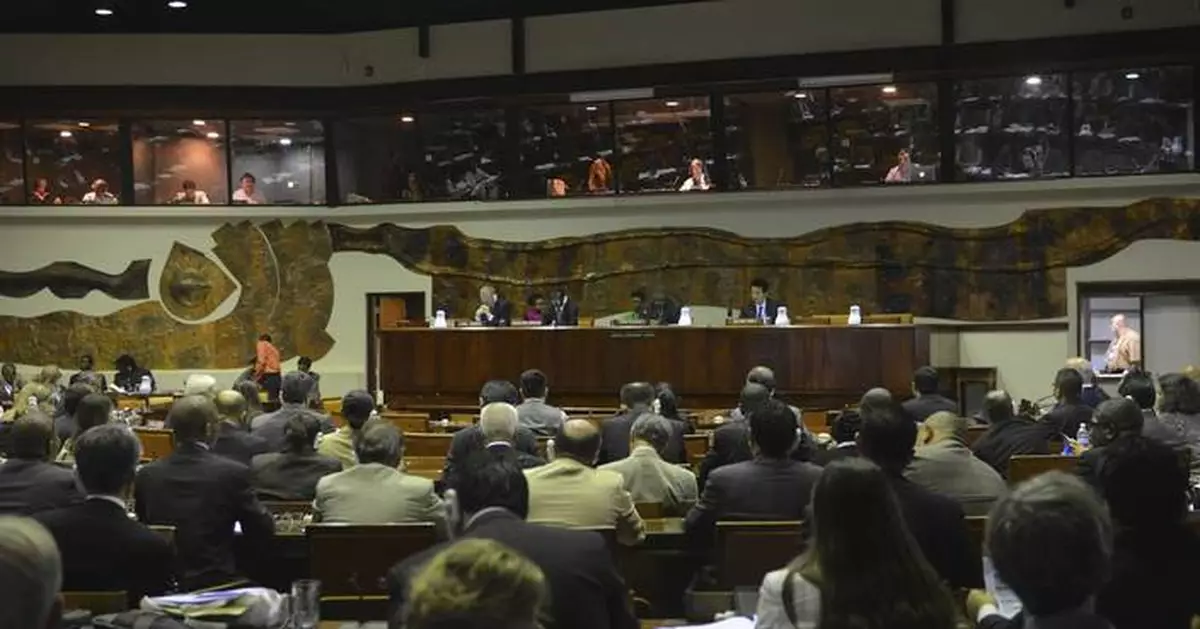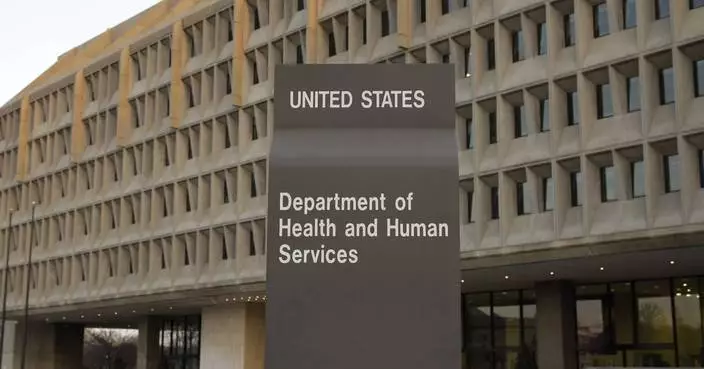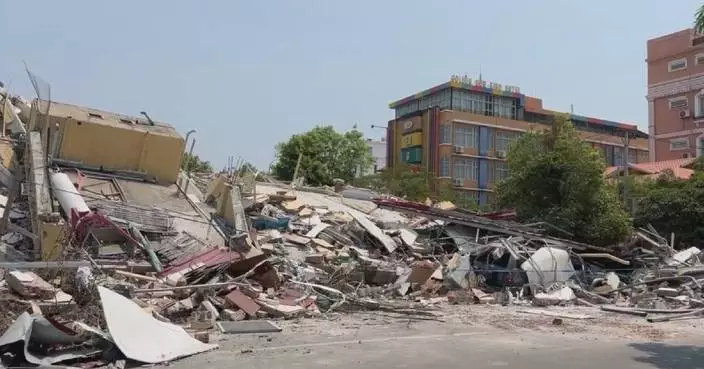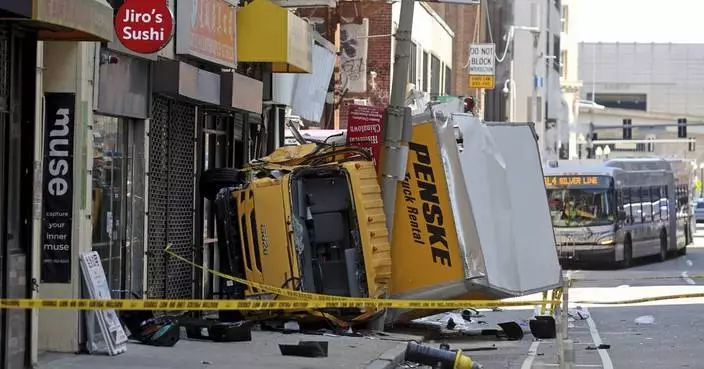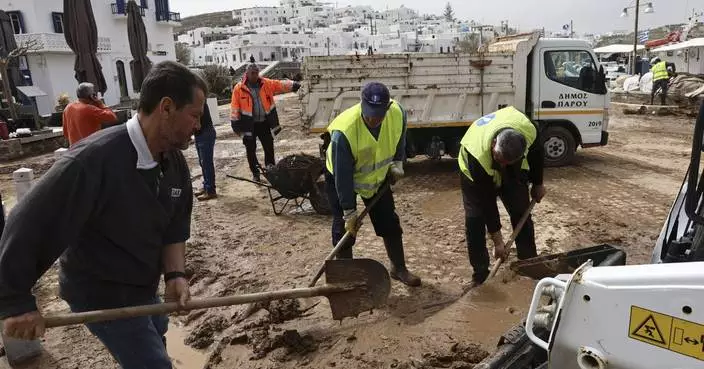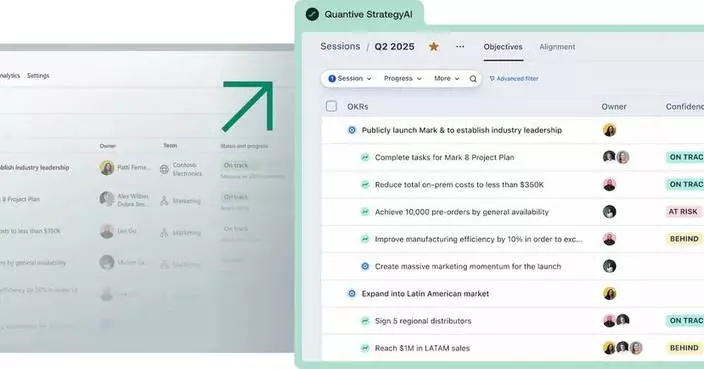SAN JUAN, Puerto Rico (AP) — An abrupt announcement rattled members of a little-known U.N. agency based in Jamaica that has protected international deep-sea waters for more than 30 years.
The Metals Company in Vancouver, Canada said late Thursday that it is seeking permission from the U.S. government to start deep-sea mining in international waters, potentially bypassing the International Seabed Authority, which has the power to authorize exploitation permits but has yet to do so.
“It would be a major breach of international law…if the U.S. were to grant it,” said Duncan Currie, an international and environmental lawyer and legal adviser to the Deep Sea Conservation Coalition, a Netherlands-based alliance of environmental groups.
The Metals Company seeks seafloor minerals like cobalt, copper, nickel and manganese used in electric car batteries and other green technology.
The announcement was made just hours before the 36-member council of the International Seabed Authority met in Jamaica on Friday, the last day of a two-week conference focused on how and if to allow deep-sea mining, a years-long debate.
The authority was scheduled to talk Friday about the company’s commercial mining application.
“The scale of the threat…has been taken incredibly seriously here,” said Louisa Casson, a campaigner at Greenpeace who attended Friday's meeting. “There are questions and a lack of clarity of what they actually plan on doing.”
She said one question is whether the company plans to request a permit anyway from the authority even as it continues talks with the U.S. government.
Currie said the timing of The Metals Company’s announcement was “insulting to the ISA.”
“It’s an extremely irresponsible threat. It’s basically holding a gun to the international community,” he said.
The International Seabed Authority was created in 1994 by the United Nations Convention on the Law of the Sea, which is ratified by more than 165 nations — but not the United States.
The Metals Company argued that the United States’ seabed mining code would allow it to start operations in international waters since it's not a member of the authority and therefore not bound by its rules.
The company said it was already in discussions with the U.S. National Oceanic and Atmospheric Administration, among others.
“We have met with numerous officials in the White House as well as U.S. Congress regarding their support for this industry,” the company said in a statement.
NOAA said in a statement that The Metals Company USA LLC, has requested a pre-application consultation with the agency to learn more about the formal license application process for deep-sea mining. It said such applications are reviewed for compliance and requirements.
“The process ensures a thorough environmental impact review, interagency consultations and opportunity for public comment,” NOAA said.
The Metals Company criticized what it said was “slow progress” by the International Seabed Authority on a proposed mining code that has yet to be finalized.
The authority has issued more than 30 exploration licenses but no provisional licenses.
Most of the current exploration is happening in the Clarion-Clipperton Fracture Zone, which covers 1.7 million square miles (4.5 million square kilometers) between Hawaii and Mexico. It is occurring at depths ranging from 13,000 to 19,000 feet (4,000 to 6,000 meters).
More than 30 countries including Canada have called for a ban, pause or moratorium on deep-sea mining, and companies including Volvo, BMW, Volkswagen, Google and Samsung have pledged not to use seafloor minerals.
“The international seabed is the common heritage of humankind, and no state should take unilateral action to exploit it,” Greenpeace said in a statement.
Scientists have warned that minerals in the ocean’s bowels take millions of years to form, and that mining could unleash noise, light and suffocating dust storms.
“The deep ocean is one of the last truly wild places on Earth, home to life we’re only beginning to understand. Letting deep-sea mining go forward now would be like starting a fire in a library of books nobody’s even read yet," said Emily Jeffers, a senior attorney at the Center for Biological Diversity.
However, companies have argued that deep-sea mining is cheaper and has less of an impact than land mining.
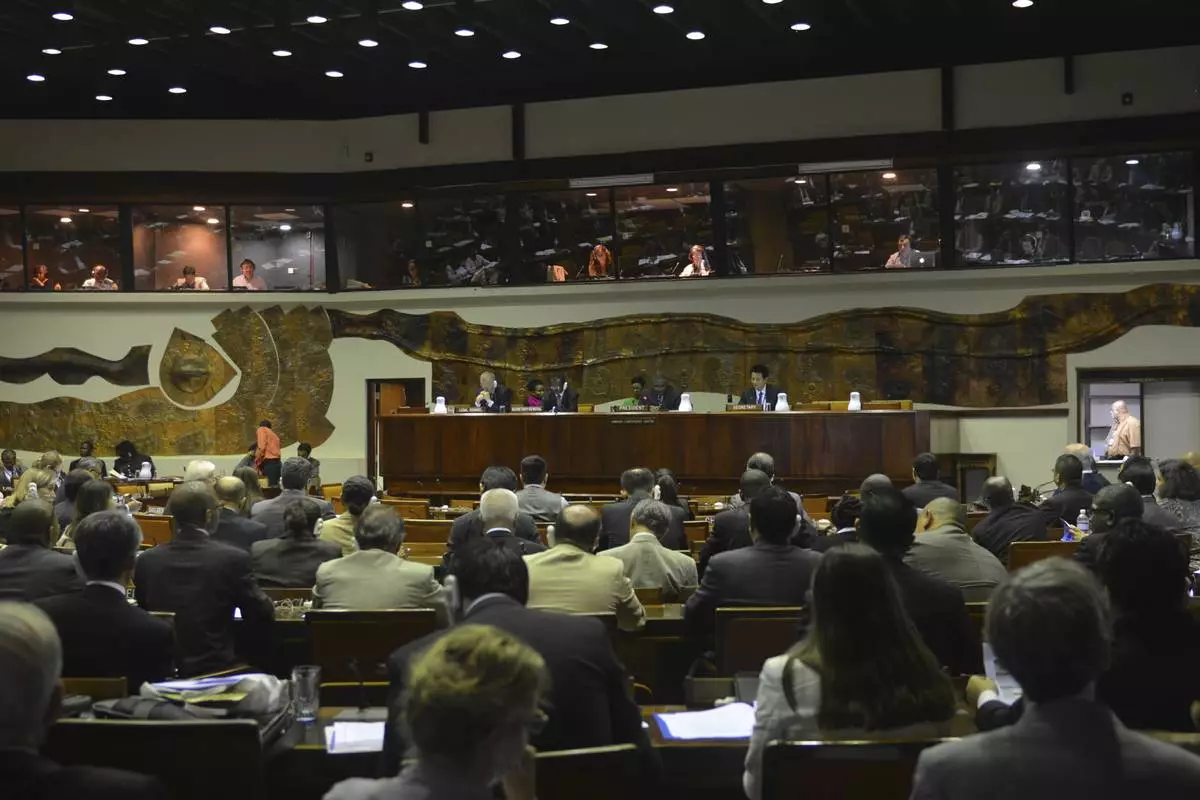
FILE - Delegates from across the world gather for a meeting by the International Seabed Authority (ISA), a U.N. body in Kingston, Jamaica, July 14, 2015. (AP Photo/David McFadden, File)
The Israeli military struck a building in Beirut’s southern suburbs early Tuesday, killing at least four people in an attack it said targeted a member of the Hezbollah militant group. The airstrike came just days after Israel launched its first attack on the Lebanese capital since a ceasefire ended fighting between Israeli forces and Hezbollah in November.
Palestinians in the Gaza Strip, meanwhile, report finding it harder to find food as bakeries were closing due to lack of flour and fuel. Israel says enough food entered Gaza during a six-week ceasefire with Hamas to sustain the territory’s roughly 2 million Palestinians for “a long period of time,” but the U.N. says its stockpiles are critically low.
For the past month, Israel has not allowed food, fuel or humanitarian aid to enter Gaza to pressure Hamas — a tactic that rights groups say is a war crime.
Here's the latest:
U.N. spokesman Stephane Dujarric said the United Nations is “at the tail end of our supplies,” forcing the U.N. World Food Program to close all 25 of its bakeries in Gaza because of a lack of flour and cooking fuel.
“WFP doesn’t close its bakeries for fun,” Dujarric said.
He said the food situation remains “very critical” since Israel closed all crossings into Gaza a month ago, cutting off all humanitarian deliveries.
COGAT, the Israeli military body in charge of civilian affairs in the Palestinian territories, said Tuesday that nearly 450,000 tons of aid entered Gaza during the ceasefire. COGAT claimed at least some of the aid from the U.N. and its humanitarian partners was being diverted to Hamas.
Responding to that, Dujarric said, “The U.N. has kept a chain of custody, and a very good chain of custody, on all the aid.”
A teenager from the West Bank who was held in an Israeli prison for six months without being charged died after collapsing in unclear circumstances, becoming the first Palestinian under 18 to die in Israeli detention, officials said.
Walid Ahmad, 17, was a healthy high schooler before his arrest in September for allegedly throwing stones at soldiers, his family said. Rights groups have documented widespread abuse in Israeli detention facilities holding thousands of Palestinians who were rounded up after Hamas’ Oct. 7, 2023, attack ignited the war in the Gaza Strip.
Israel’s prison service did not respond to questions about the boy's cause of death.
The family believes Walid contracted amoebic dysentery from the poor conditions in the prison, an infection that causes diarrhea, vomiting and dizziness — and can be fatal if left untreated.
Prison authorities deny any systematic abuse and say they investigate accusations of wrongdoing by prison staff. But the Israeli ministry overseeing prisons acknowledges conditions inside detention facilities have been reduced to the minimum level allowed under Israeli law.
The Western-backed Palestinian Authority says he is the 63rd Palestinian from the West Bank or Gaza to die in Israeli detention since the start of the war.
Accompanied by German diplomats, hundreds of Gaza residents were flown from southern Israel’s Ramon Airport to the German city of Leipzig on Tuesday, the Israeli Interior Ministry said in a statement.
Interior Minister Moshe Arbel visited the airport “with the aim of examining the process of voluntary departure of Gazans to a third country,” the statement said.
German officials did not immediately respond to requests for comment on the flight.
Israel’s Cabinet recently approved a new directorate tasked with advancing the “voluntary departure” of Palestinians from Gaza, in line with U.S. President Donald Trump’s proposal to depopulate Gaza and rebuild it for others. The Defense Ministry said the new body would coordinate “passage by land, sea and air to the destination countries.”
Tuesday’s statement appeared to be the first official announcement by Israel that Palestinians were leaving as part of such a plan.
Trump’s plan has been universally rejected by Palestinians, who view it as forcible expulsion from their homeland. Human rights experts say it would likely violate international law.
The Interior Ministry statement said hundreds more Palestinians from Gaza had been flown to a third country “since the beginning of the process,” mainly to Germany, Romania and United Arab Emirates.
Dozens or Palestinians lined up outside a United Nations warehouse in northern Gaza on Tuesday to receive food parcels from the agency’s rapidly dwindling supplies, as Israel has imposed a total blockade on Gaza for the past month.
Nageya Gaballah, a displaced woman living in a tent with 10 family members, said she wouldn’t be able to secure essentials if it weren’t for aid and vouchers distributed by UNRWA, the U.N. agency for Palestinian refugees. She lost her job as a cleaning staffer at the Indonesian Hospital in northern Gaza last month and her husband is unemployed.
At the warehouse in Jabaliya, UNRWA distributed flour bags and food parcels with cooking oil, canned tuna, beans, hummus, salt, sugar and yeast.
Mohamed Ghabn, who is also unemployed, said securing food has become extremely difficult, as he cannot afford to buy it from markets when it's available, and World Food Program-supported bakeries have shut down. He said a bag of pita bread costs 30 shekels ($8) and a kilogram of tomatoes is priced at 15 shekels ($4).
“We are unemployed and don’t have jobs. We’re just sitting there, and we don’t have shelter or anything … simply speaking, I can’t feed my children,” he said.
Mohamed Salah Bardawil was a journalist with the Hamas-affiliated Aqsa Radio. He was the nephew of Salah Bardawil, a well-known member of Hamas’ political bureau who Israel killed last month in a strike that also killed his wife.
The Israeli military did not immediately comment on the strike, which hit the journalist's home early Tuesday in the southern Gaza city of Khan Younis and killed his wife, two daughters and son.
Associated Press footage showed the building completely collapsed, with dried blood splatted on the grey rubble. Nearby, a child’s school notebook, dust-covered dolls and clothing lay half-buried in the ruins.
Fathi Nushasi, a Khan Younis resident who lives nearby, said the airstrike felt like an earthquake.
"I've witnessed many wars, but I have never seen anything like what happened to us. The rubble entered our bedroom,” he said.
Dozens of people gathered at Nasser Hospital for funeral prayers, with one man crying in anguish, “Those were children sleeping!” A press vest was placed over Bardawil's body bag.
Israel has killed over 170 journalists and media workers since the war with Hamas began in October 2023, the Committee to Protect Journalists estimated as of March 24. Most recently, prominent Al Jazeera journalist Hossam Shabat was killed by a strike on his car.
Israel says enough food entered the Gaza Strip during its six-week ceasefire with Hamas to sustain the territory’s roughly 2 million Palestinians for “a long period of time.”
U.N. agencies have warned that food is running out, and Palestinians in Gaza say markets are largely empty after Israel cut off the supply of food, fuel and humanitarian aid to the territory at the beginning of March to pressure Hamas.
COGAT, the Israeli military body in charge of civilian affairs in the Palestinian territories, said Tuesday that more than 25,000 trucks entered Gaza during the ceasefire, carrying nearly 450,000 tons of aid. It said that amount represented around a third of what has entered during the entire war.
“There is enough food for a long period of time, if Hamas lets the civilians have it,” it said.
Palestinians in the Gaza Strip say it’s even harder to find food as bakeries close due to a tightened Israeli blockade of the territory.
The World Food Program was forced to close another 19 bakeries that had served hundreds of thousands of people because its supplies are dwindling, according to an internal memo circulated among aid groups on Monday.
Mohammed al-Kurd, a father of 12, said his children go to bed without dinner.
“We tell them to be patient and that we will bring flour in the morning,” he said. “We lie to them and to ourselves.” Sulaiman Hasanat, a father of seven, said his family often spends an entire day searching for bread without any luck.
Israel cut off the supply of food, fuel, medicine and humanitarian aid to Gaza’s roughly 2 million Palestinians in early March to pressure Hamas into accepting changes to their ceasefire agreement. Israel resumed airstrikes and ground operations later that month.
The World Food Program says it’s immediately closing all of its bakeries in Gaza following a monthlong blockade by Israel into the strip.
In an internal memo circulated among aid groups Monday, the U.N. agency said that due to the lack of humanitarian aid, its supplies are running out and it doesn’t have enough wheat flour needed to make bread.
The agency said it’s distributed all available food rations, and there are unfortunately no more stocks.
For four weeks, Israel has shut off all sources of food, fuel, medicine and other supplies for the Gaza Strip’s population of more than 2 million Palestinians. It’s the longest blockade yet of the 17-month war with Hamas, with no sign of it ending.
Aid workers have stretched supplies, but warn of a catastrophic surge in severe hunger and malnutrition.
Israeli Prime Minister Benjamin Netanyahu has withdrawn his nomination of a former navy commander to lead the country’s internal security agency after a flurry of criticism.
Netanyahu’s office said in a statement early Tuesday after meeting with Vice Adm. Eli Sharvit that he “intends to examine other candidates,” without elaborating.
The nomination announced on Monday had provoked widespread criticism from allies and opponents.
Critics of Netanyahu are already up in arms over his move to fire Ronen Bar, the current head of the Shin Bet domestic security agency, viewing it as part of a broader assault on state institutions at a time when Netanyahu is on trial for alleged corruption and his aides are being investigated over links to the Gulf Arab nation of Qatar.
Israel’s Supreme Court froze Bar’s dismissal pending further hearings but cleared the way for Netanyahu to interview candidates for the job.
The nomination of Sharvit angered some of Netanyahu’s allies after Israeli media reported that he had taken part in protests against Netanyahu’s plans to overhaul the judiciary in 2023.
The move also brought an unexpected rebuke from Sen. Lindsey Graham, a top ally of President Donald Trump, who tweeted an excerpt of an op-ed Sharvit had written for an Israeli technology news website in January 2024 criticizing Trump’s climate policies.
Graham called the nomination “beyond problematic.”
The Israeli military says it intercepted a projectile fired from the Gaza Strip early Tuesday that set off sirens in nearby communities.
Palestinian militants have fired a small number of rockets, without causing any casualties or damage, since Israel ended its ceasefire with Hamas last month.
Israel has launched waves of airstrikes and limited ground operations, killing hundreds of Palestinians.
Hamas ignited the war with its Oct. 7, 2023, attack into Israel, in which militants killed some 1,200 people, mostly civilians, and abducted 251, most of whom have since been released in ceasefires or other deals. Hamas is still holding 59 hostages, 24 of whom are believed to be alive.
Israel’s offensive has killed over 50,000 Palestinians, according to Gaza’s Health Ministry, which does not say how many were combatants or civilians.
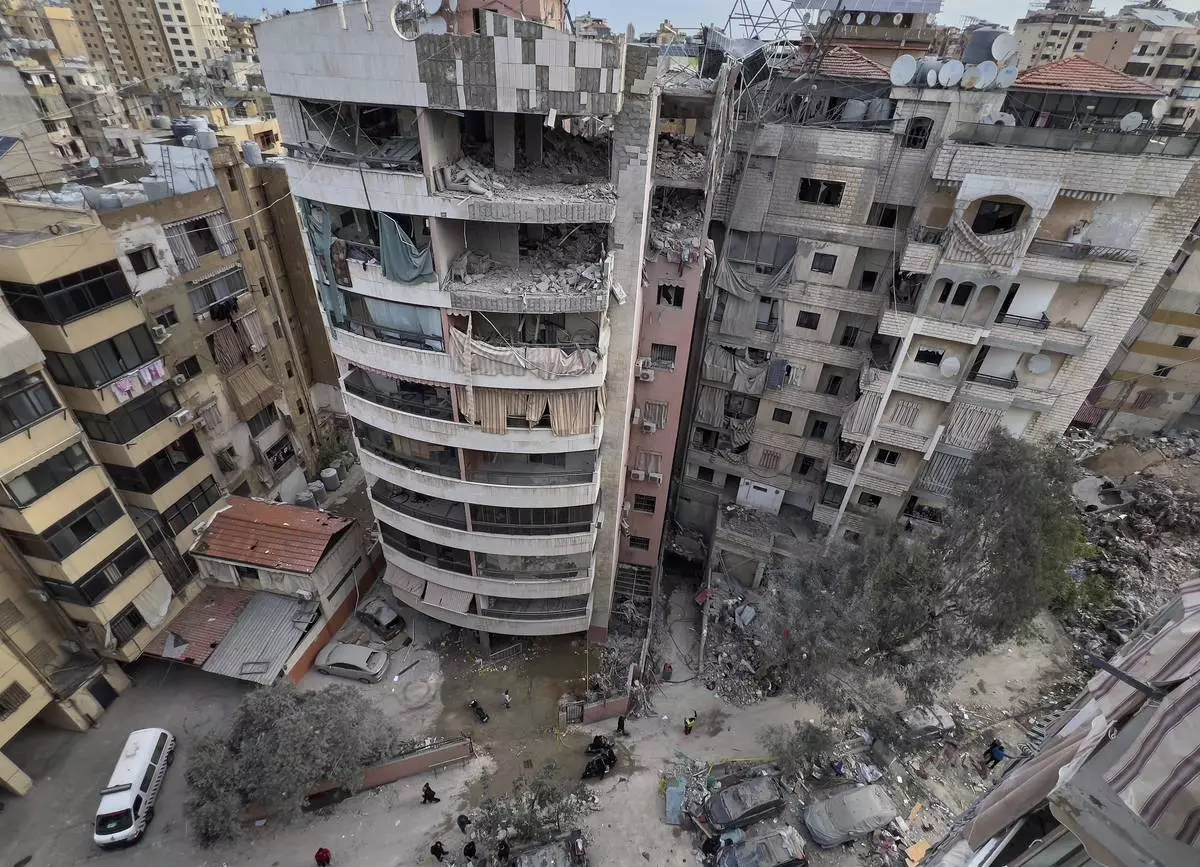
Damaged apartments building are seen after being struck earlier by an Israeli targeted attack in Dahiyeh, a southern suburb of Beirut, Lebanon, early Tuesday, April 1, 2025. (AP Photo/Hussein Malla)
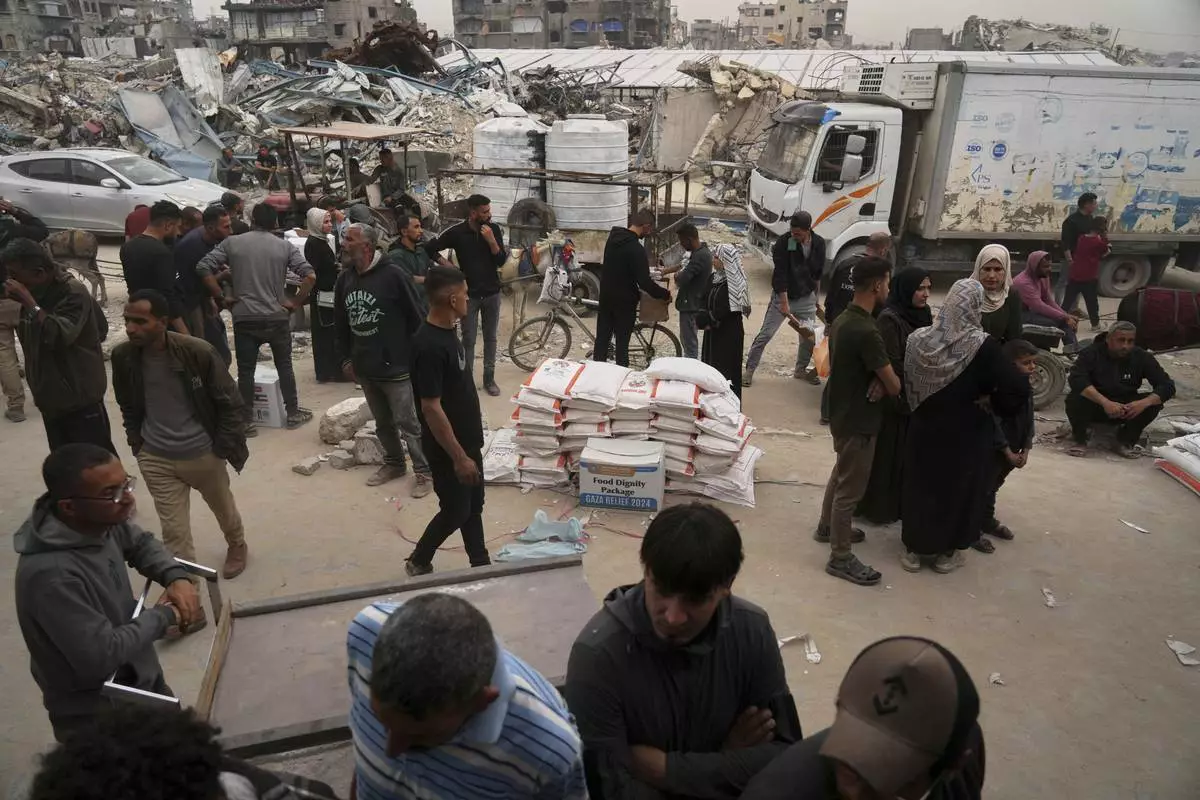
Palestinians receive bags of flour and other humanitarian aid distributed by UNRWA, the U.N. agency helping Palestinian refugees in Jabaliya, Gaza Strip on Tuesday, April 1, 2025. (AP Photo/Jehad Alshrafi)
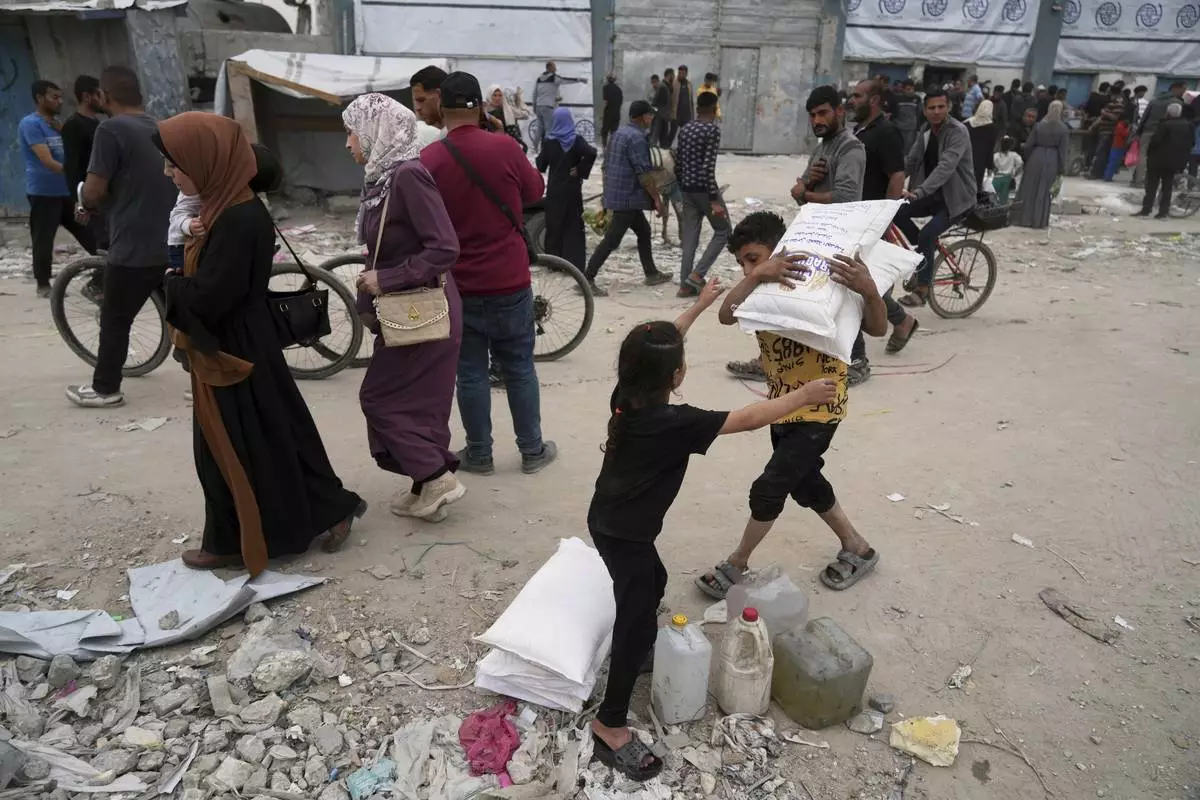
Palestinians receive bags of flour and other humanitarian aid distributed by UNRWA, the U.N. agency helping Palestinian refugees in Jabaliya, Gaza Strip on Tuesday, April 1, 2025. (AP Photo/Jehad Alshrafi)
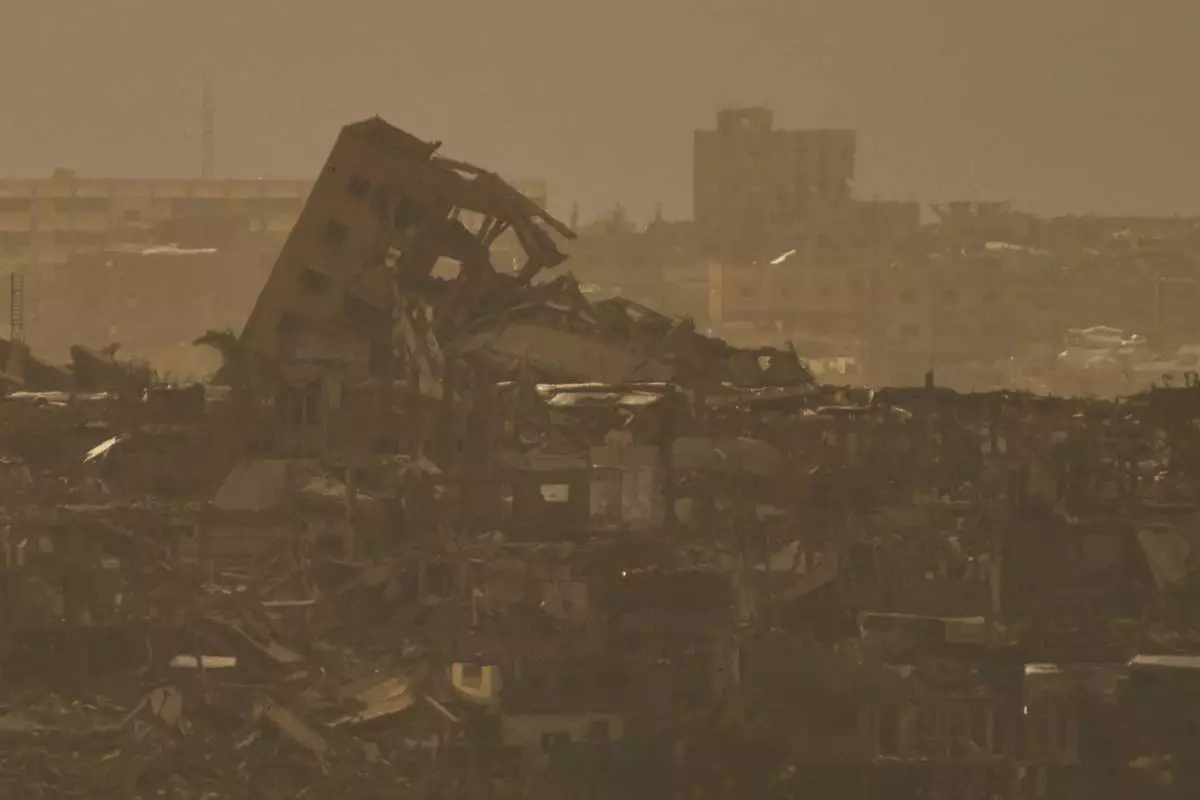
Buildings that were destroyed during the Israeli ground and air operations stand in northern of Gaza Strip as seen from southern Israel, Tuesday, April 1, 2025. (AP Photo/Leo Correa)
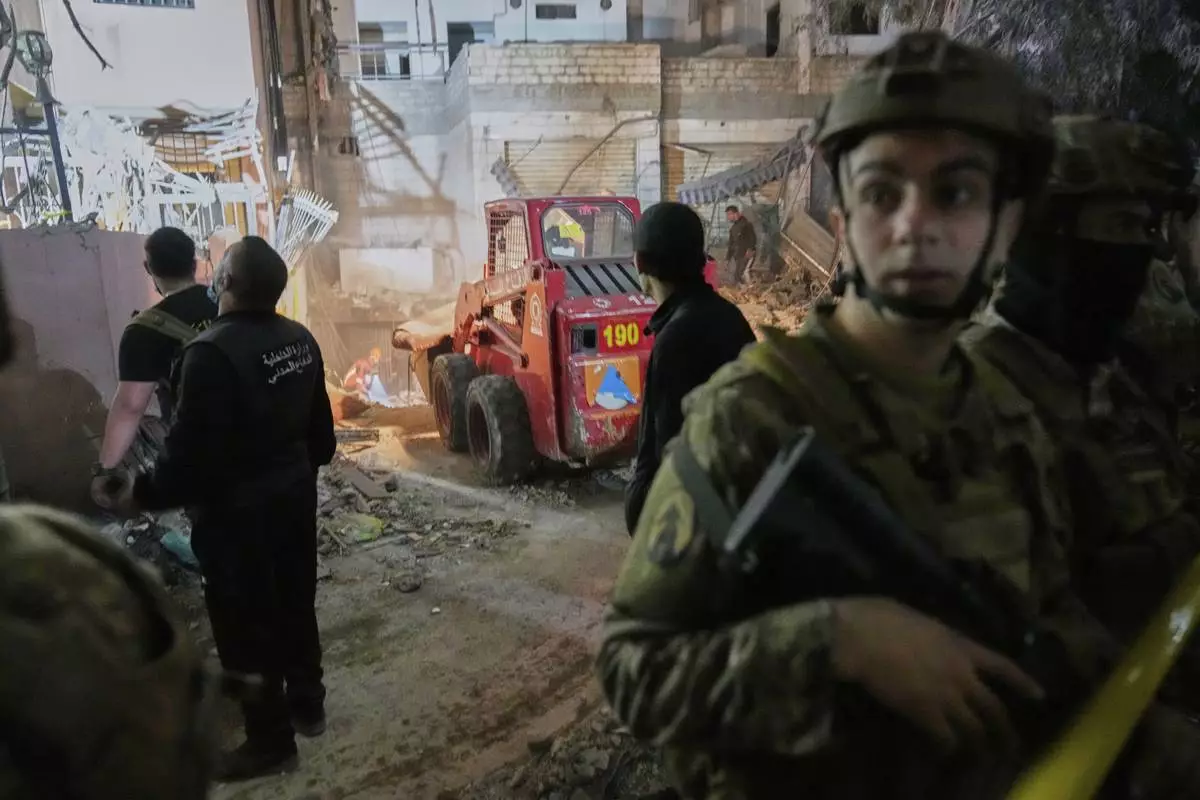
Civil defence and Lebanese army soldiers work at the site of an Israeli targeted strike on an apartment building in Dahiyeh, in the southern suburb of Beirut, Lebanon, early Tuesday, April 1, 2025.(AP Photo/Hussein Malla)
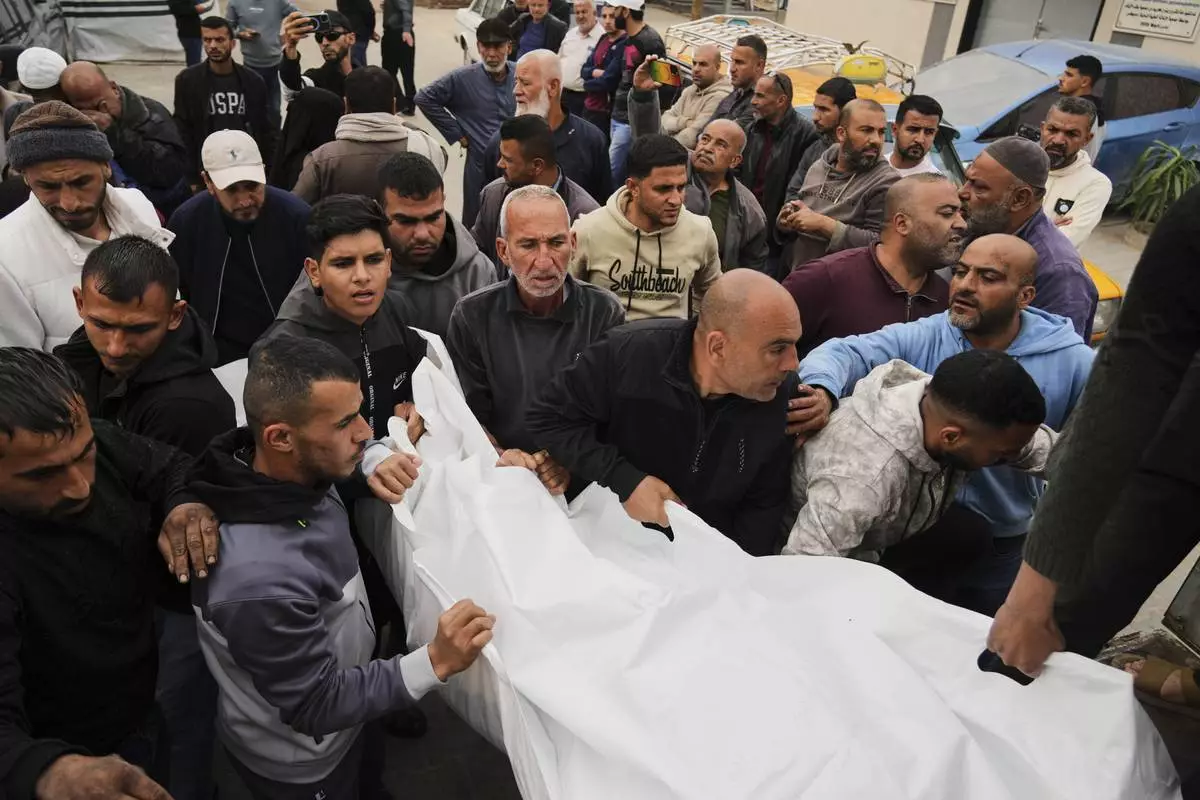
Mourners carry the bodies of three members of Dahouh family, killed when an Israeli army strike hit their tent, before their burial at the hospital in Deir al-Balah, Gaza Strip on Tuesday, April 1, 2025. (AP Photo/Abdel Kareem Hana)
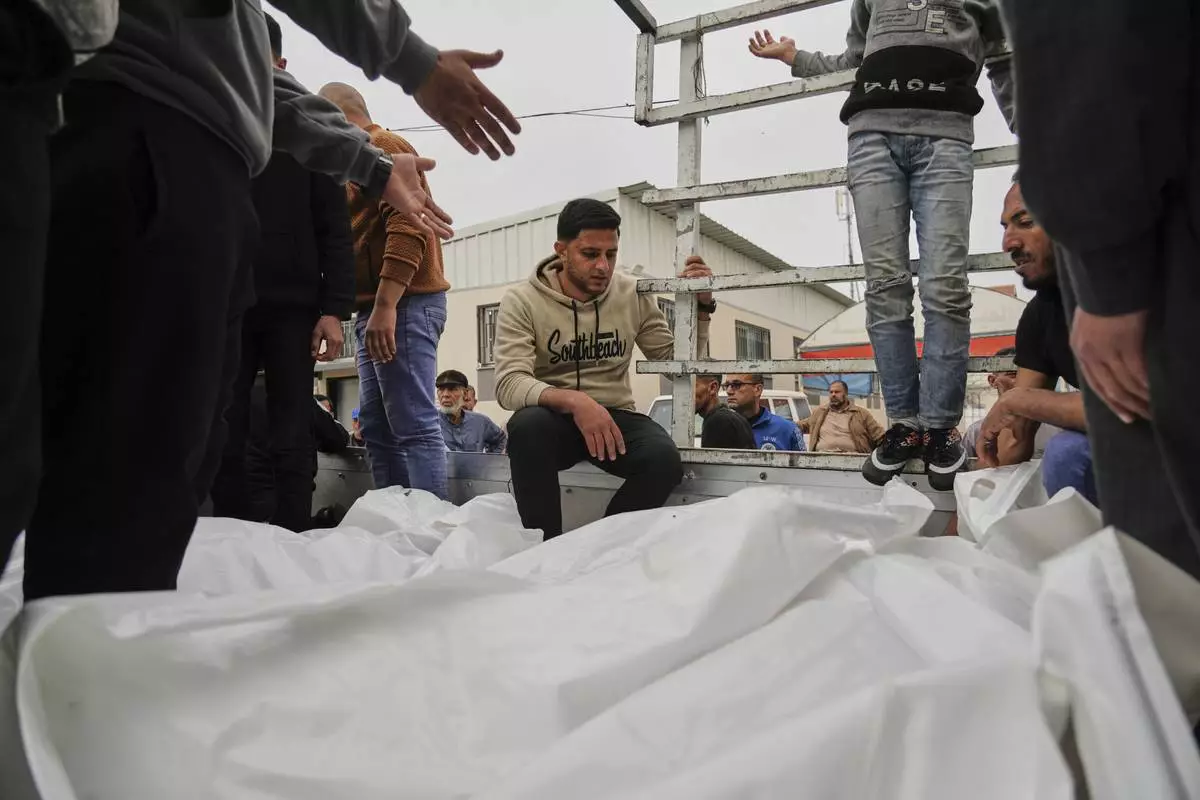
Mourners carry the bodies of three members of Dahouh family, killed when an Israeli army strike hit their tent, before their burial at the hospital in Deir al-Balah, Gaza Strip on Tuesday, April 1, 2025. (AP Photo/Abdel Kareem Hana)
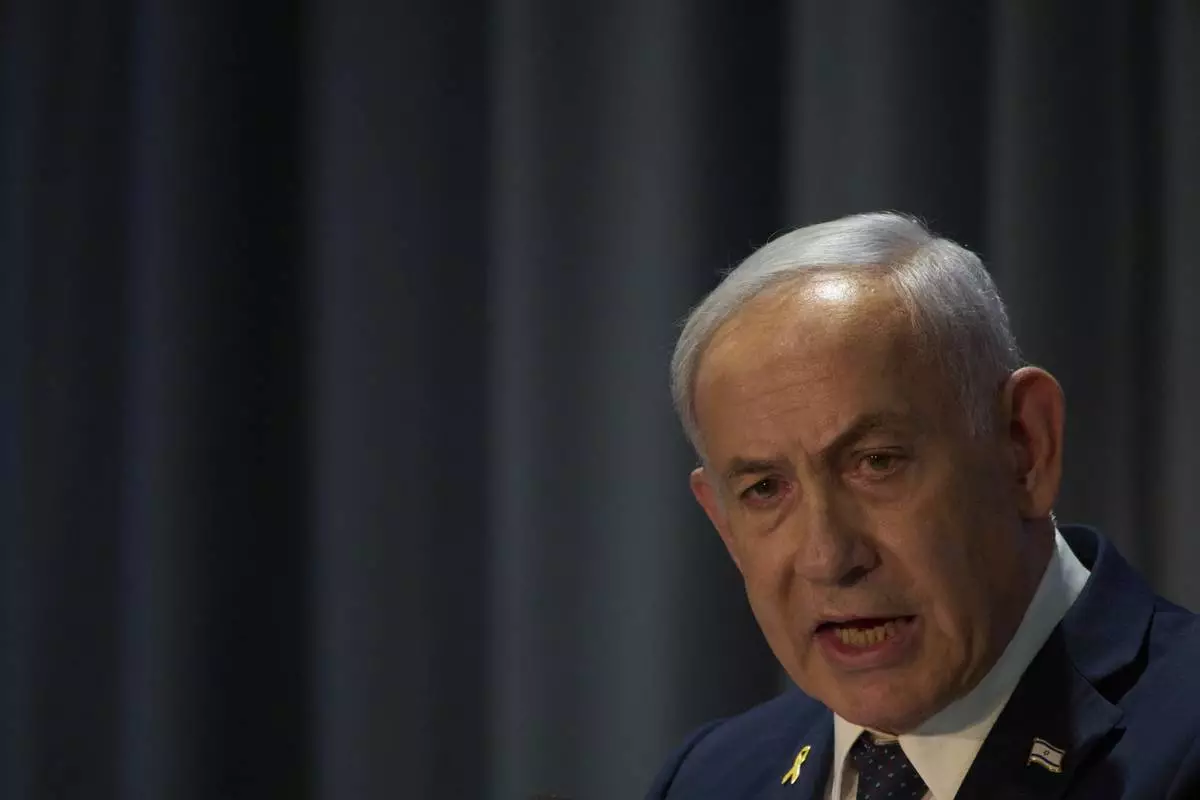
Israel's Prime Minister Benjamin Netanyahu delivers a speech during the International Conference on Combating Antisemitism in Jerusalem, Israel,Thursday, March 27, 2025. (AP Photo/Leo Correa)
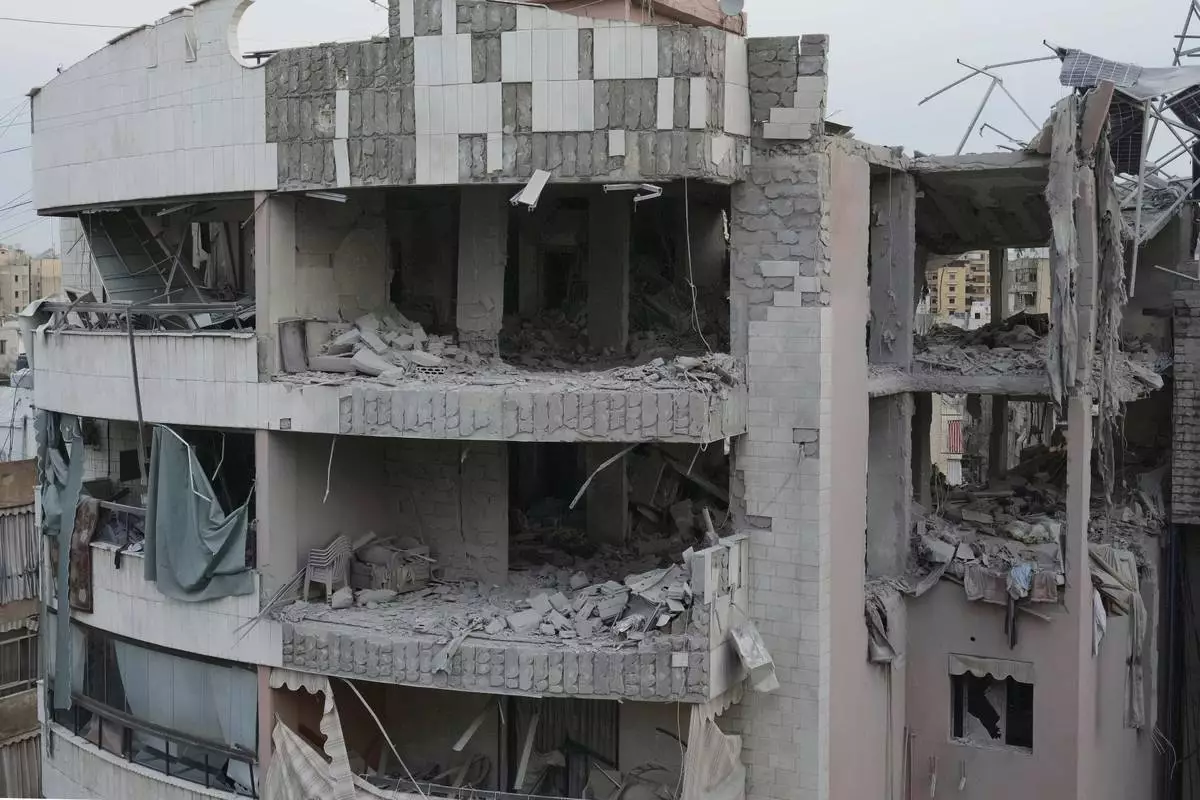
Damaged apartment buildings are seen after being struck earlier by an Israeli attack in Dahiyeh, a southern suburb of Beirut, Lebanon, early Tuesday, April 1, 2025. (AP Photo/Hussein Malla)
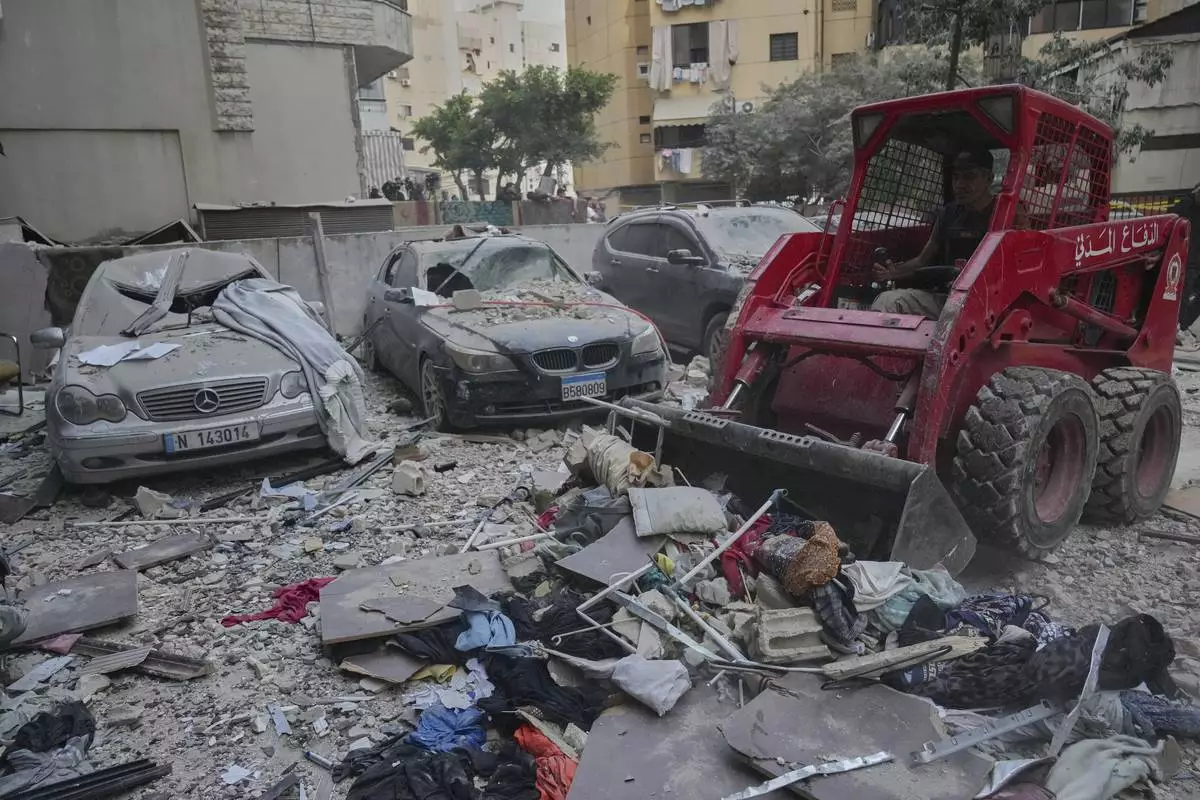
Civil defence workers clean the debris after an apartemnet building was hit by Israeli targeted strike in Dahiyeh, in the southern suburb of Beirut, Lebanon, early Tuesday, April 1, 2025.(AP Photo/Hussein Malla)

FILE -Vice Adm. Eli Sharvit arrives on board the Israeli Navy Ship Atzmaut in the Mediterranean Sea, Sept. 1, 2021. (AP Photo/Ariel Schalit, File)



